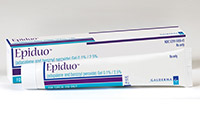Product
Epiduo Gel
Approval Date
Dec. 8, 2008
Release Date
Currently available
Company
Galderma Laboratories
Class
Rentinoid antibacterial/keratolytic
Indication
For the treatment of Acne vulgaris in patients 12 and older.
Active Ingredient
Adapalene 0.1%, benzoyl peroxide 2.5% gel
Agency Roster
Echo Torre Lazur
Marketing Strategy/Execution
Epiduo Gel 0.1% / 2.5% is the first and only topical acne medication that combines a retinoid and benzoyl peroxide—and targets three out of the four causes of acne in a single product. The two treatments that make up Epiduo Gel include the well-tolerated retinoid adapalene, and benzoyl peroxide, a well-known antimicrobial. Clinical studies demonstrate that Epiduo Gel works better than adapalene 0.1% or benzoyl peroxide 2.5% used alone and significantly reduces acne. Galderma plans to promote these treatments to a variety of audiences.
Physician Outlook
Combination products, which offer greater convenience than multi-drug regimens, as well as the potential for lower copays, are increasingly favored for acne treatment. Galderma’s Epiduo gel (adapalene) plus benzoyl peroxide) combines two standard acne treatments in a once daily formulation. With patient compliance an unmet need, physicians are likely to be receptive to this new alternative.
—Mary McBride, Associate Vice President, GfK Healthcare
Also in the Pipeline (courtesy of Adis R&D Insight)
Drug: W0265
Manufacturer: Stiefel Laboratories
Indication: Acne vulgaris
Active ingredient: W0265
Phase: III
Source: Wolters Kluwer Health
Recent MM&M Coverage
Brand Pharm
The Top 75: echo Torre Lazur
Pharmacology
Epiduo is a topical acne treatment that combines adapalene with benzoyl peroxide. Adapalene is a naphthoic acid derivative with retinoid-like properties that binds to specific retinoic acid nuclear receptors resulting in modulation of cellular differentiation, keratinization, and inflammation. Benzoyl peroxide is a highly lipophilic oxidizing agent that localizes in bacterial and keratinocyte cell membranes to exert bactericidal and keratolytic effects.
Clinical Trials
Epiduo was evaluated in two 12-week, multicenter, controlled clinical studies of similar design. At baseline, patients in both studies had between 20–50 inflammatory lesions and 30–100 noninflammatory lesions. Treatment response was defined as the percent of patients who had a two grade improvement and rated “Clear” and “Almost Clear” at week 12 based on the Investigator’s Global Assessment (IGA) and mean absolute change from baseline at week 12 in both inflammatory and non-inflammatory lesion counts. In both studies, patients were randomized to one of four treatment groups: Epiduo, adapalene 0.1% monotherapy, benzoyl peroxide 2.5% monotherapy or vehicle gel. A greater reduction in the median number of total acne lesions was seen in the Epiduo groups compared to the other three treatment groups. Also, the percent of patients who had a two grade improvement and rated “Clear” or “Almost Clear” on the IGA was greater in the Epiduo groups compared to the other three treatment groups.
Adverse Reactions
Erythema, scaling, dryness, burning, stinging, contact dermatitis, skin irritation; may bleach fabrics or hair.
Adults
Apply thin film to affected areas of face and/or trunk once daily after washing. Reduce frequency or discontinue if prolonged or severe irritation occurs.
Children
Not recommended.
Precautions
Do not use on cuts, abrasions, eczematous or sunburned skin. Avoid eyes, lips, mucous membranes, sun, UV light. Increased irritation in extreme weather. Pregnancy (Cat. C). Nursing mothers.
Interactions
Caution with sulfur, resorcinol, salicylic acid, and other topical acne products. Avoid using concomitant topical irritants and waxing treated areas.








